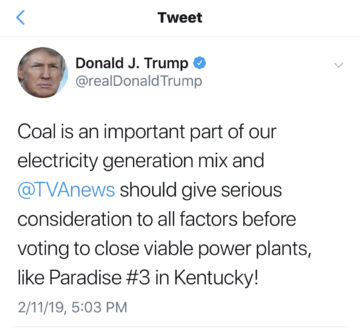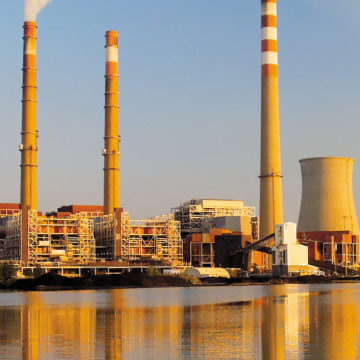After much speculation, in a split vote the Tennessee Valley Authority voted at their quarterly board meeting today to ignore President Trump’s appeal and make the decision to recommend the retirement of both Paradise Unit 3 and Bull Run, two aging coal plants in Kentucky and Tennessee respectively. Amelia Shenstone, former Regional Advocacy Director with the Southern Alliance for Clean Energy, also contributed to this blog.
Maggie Shober and Amy Vaden | February 14, 2019 | Coal, Kentucky, Tennessee
Today, SACE is happy to announce the retirements of two old, inefficient, unnecessary coal-fired power plants on TVA’s system. We agree with President Trump that TVA “should give serious consideration to all factors” when determining whether to continue operating aging coal plants in Kentucky and Tennessee. In fact, in response to Trump’s recent Twitter recommendation that TVA reconsider closing Paradise 3, we listed our top 10 reasons that the closure(s) are a SMART decision. Here’s our countdown:
#10: Paradise 3 (and Bull Run) are Uneconomical
TVA has already stated that further operation of Paradise Unit 3 is not profitable. TVA performed a detailed analysis of the economics of both Paradise 3 and another coal plant, Bull Run in Anderson County, Tennessee, and found that neither are economic to run. Both plants are old and inefficient. In 2017, according to data from the EIA, Paradise only ran 23% of the time and Bull Run 35% of the time. TVA is a public utility. Continuing to use these expensive plants will ultimately hurt TVA customers on their bills.
With demand for electricity generally declining, thanks in part to energy efficiency measures and small-scale solar production, TVA can close Paradise without needing to replace the full power-producing capacity.
#9: Coal Plants are Inflexible & Impractical
Coal plants, especially old ones like Paradise 3 and Bull Run, take a long time to turn on or off, are less efficient when operated to “load follow” (i.e. turn up or down as demand for electricity increases and decreases), and operate less efficiently when it’s hot outside. And as TVA found in its Environmental Assessment, the aging Paradise unit, built in 1970 “does not provide the level of flexibility needed to balance hourly, daily and seasonal changes in energy consumption….”
#8: Three’s Company
TVA already converted Paradise Units 1 & 2 from coal to natural gas.
#7: Coal Ash Pollution
TVA is already in enough of a moral, financial, and public relations mess after the 2008 coal ash disaster at its Kingston plant. Burning coal produces toxic coal ash; every minute these coal plants operate adds to the risk of contaminating water and the people who rely on it.
#6: Aesthetics

John Prine famously memorialized the same Kentucky town that is home to the Paradise coal plant, remembering that coal miners had already “tortured the timber and stripped all the land… [and] dug for their coal till the land was forsaken…” The song is about Peabody Energy, the company that had a longstanding contract with TVA to supply the Paradise plant. Coal mining depletes the natural value of the land, and coal plants are ugly and smelly. Closing the plant will open the possibility of remediating the surrounding area or making space for new businesses that can improve quality of life in the area.
#5: Environmental benefits
Closing a coal plant will immediately improve air quality by reducing sulfur dioxide (SO2) associated with acid rain, nitrogen oxides (NOx) that cause smog, and particulate matter so tiny that it can enter the bloodstream through the lungs. Every ton of coal that is left in the ground prevents the release of toxic chemicals like mercury, arsenic, and lead into our environment.
#4: Health benefits
Improved air quality is directly tied to lower health costs to the tune of many hundreds of millions of dollars. Meanwhile, black lung disease continues to plague the coal mining community.
#3: Economic benefits
Replacing coal with solar and energy efficiency could create more jobs than the plant currently employs. According to the Solar Foundation’s 2017 Solar Jobs Census, Kentucky had 1,293 jobs in the solar industry in 2017, an increase of 8% in 2017. Energy efficiency is an even greater job driver. Kentucky’s 1st congressional district, which covers western Kentucky and includes Muhlenberg County, boasted 4,499 jobs in the energy efficiency industry in 2018. In addition to the promise to move Paradise 3 and Bull Run employees to other TVA jobs in their service area, TVA should also invest in energy efficiency and solar in Kentucky and Tennessee, adding to these booming energy industries and creating new economic opportunities for workers and communities. Such investments by TVA, especially in concert with local leadership, could reverse and potentially outweigh any adverse economic impacts of retiring these old coal plants.
#2: Environmental Justice
Living in close proximity to coal plants has serious consequences: toxic emissions like SO2, NOx, and particulate matter poison the air and water near the plants. And these impacts are felt disproportionately among low-income communities and communities of color, making the decision to close a coal plant a decision about social justice. According to the NAACP’s Coal Blooded Report, people of color are more densely populated within 3 miles of coal plants than nationally; and the average per capita income is lower than the U.S. average. In fact, Paradise 3 and Bull Run are not even TVA’s worst offenders in the NAACP’s environmental justice rankings: Paradise and Bull Run ranked at C+ and C respectively while Shawnee and Kingston both received a grade of D+. Maybe they should be the next to undergo an economic study for early retirement.
Every time a company closes a coal plant it’s a win for environmental justice.
And the #1 factor TVA should take into consideration when determining whether to close Paradise 3 and Bull Run: Reduce CO2 emissions
Retiring Paradise 3 early will reduce CO2 emissions by 2.8 million (if replaced with natural gas) to 4.4 million (if replaced with renewable energy and energy efficiency) metric tons. Retiring Bull Run early would reduce CO2 emissions to the tune of 1-1.7 million metric tons, similarly depending on replacement fuel. That means that if TVA were to make the right decision based on its own economics they could avoid future CO2 emissions equivalent to taking 1.3 million cars off the road annually. It’s a no brainer.